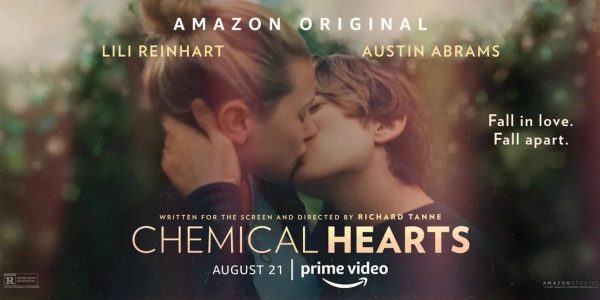Chemical Hearts, 2020.
Directed by Richard Tanne.
Starring Austin Abrams, Lili Reinhart, Sarah Jones, Kara Young, Coral Peña and C.J. Hoff.
SYNOPSIS:
The editor of a high school newspaper bonds with a new student who was injured in an accident.
There’s no shortage of movies about the awkwardness of first love. Some douse the entire thing in soft focus camerawork to romanticise the heck out of every moment, while others pile on the cringe in attempting to convey the clumsy romance of teenagers. Richard Tanne’s Chemical Hearts, adapted from the novel by Krystal Sutherland, lands somewhere between the two. It’s an overwrought, but ultimately likeable, take on the strange, embryonic struggles of young love, particularly when grief enters into the mix.
The movie opens with a mildly insufferable opening monologue from Austin Abrams’s protagonist Henry, who declares that “nothing interesting or remarkable had ever happened to me”, echoing just about every teenage movie character ever. That changes when he is made editor of the student paper during his senior year and is asked to work with Grace (Lili Reinhart), who has transferred from a nearby school in the wake of an accident that has left her with serious damage to her knee. He is immediately fascinated by Grace and they begin to form a tentative friendship, despite her unwillingness to open up emotionally.
 Chemical Hearts slots pretty conventionally into the pantheon of slightly moody teen romances, lacking the acerbic spark of something like The Edge of Seventeen or even the luminously amiable cheese of Disney+’s recent Stargirl. Tanne’s film is enjoyable enough, and there are flashes of something very special, but for the most part it’s exactly what you will expect it to be when you hit the play button. It’s cosy, gentle and packs just enough emotional punch for it to be satisfying.
Chemical Hearts slots pretty conventionally into the pantheon of slightly moody teen romances, lacking the acerbic spark of something like The Edge of Seventeen or even the luminously amiable cheese of Disney+’s recent Stargirl. Tanne’s film is enjoyable enough, and there are flashes of something very special, but for the most part it’s exactly what you will expect it to be when you hit the play button. It’s cosy, gentle and packs just enough emotional punch for it to be satisfying.
The material is lifted shoulder high by both Abrams and Reinhart, with the latter especially delivering a performance considerably better than Tanne’s often cliché-ridden screenplay. Reinhart and Abrams give believable roughness to their characters, as if these are teenagers desperate to project a particular image of themselves, even if that sabotages their relationships. Intimate scenes between them are played with a refreshing realism, pushing past the generic trappings of the setup to provide an enjoyable emotional authenticity.
 Like any teen movie, Chemical Hearts also packs a colourful cast of supporting characters. Or at least, they would be colourful if the movie were to spend any real time with them. A lesbian romance is pushed to the side for much of the story and nobody else even gets enough time in front of the camera for their name to be memorable. Given how little time the movie spends with anyone else, the protagonists should probably be much more richly drawn than they are.
Like any teen movie, Chemical Hearts also packs a colourful cast of supporting characters. Or at least, they would be colourful if the movie were to spend any real time with them. A lesbian romance is pushed to the side for much of the story and nobody else even gets enough time in front of the camera for their name to be memorable. Given how little time the movie spends with anyone else, the protagonists should probably be much more richly drawn than they are.
Chemical Hearts is an intriguing and sparky tale, but one that’s let down by its desire to indulge in the stereotypes and conventions that it has all of the tools to take apart. Even in its most emotional moments, the tone is unfailingly gentle, despite the serious ideas and hefty themes. The movie’s approach oscillates wildly between bracingly real and unbearably ham-fisted, as if the entire film is unsure whether it wants to shoot for fantasy or tell a story with genuine relevance. Thanks to Reinhart and Abrams, though, it’s a pleasant enough world to be in.
Flickering Myth Rating – Film: ★ ★ ★ / Movie: ★ ★ ★
Tom Beasley is a freelance film journalist and wrestling fan. Follow him on Twitter via @TomJBeasley for movie opinions, wrestling stuff and puns.











